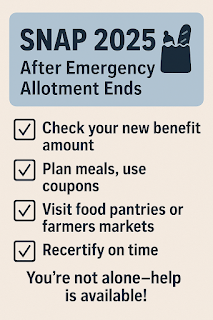Navigating SNAP Changes in 2025: Understanding Your Rights to Food Support
Worried about stretching your grocery budget now that SNAP emergency allotments have ended? You’re not alone. With the extra pandemic-related SNAP benefits officially phased out, many families are facing smaller monthly grocery budgets just as food prices remain high. But you still have options—and with a little planning, you can keep healthy food on the table.
What’s Changed for SNAP in 2025?
No More Emergency Allotments: Households now receive only their regular, pre-pandemic benefit amount. This might feel like a significant cut if you’ve relied on the temporary boost over the past few years.
Adjusted Maximums: Some states may have updated their standard SNAP maximum benefit amounts based on federal guidelines. It’s important to check your current benefit notice to confirm your exact monthly amount.
Certification Reminders: With benefit changes, it’s crucial to ensure you renew and recertify your eligibility on time. Missing paperwork or deadlines can lead to a temporary pause or termination of your benefits.
How to Make Your Dollars Go Further Now
Double-Check Your Benefit Letter: Understanding your precise new monthly amount is the first step in effective budget planning.
Utilize All Available Discounts: Many states and local programs now offer "double-up food bucks" at farmers markets, which can double your SNAP purchasing power for fresh produce.
Look for special deals or discounts specifically for SNAP EBT users at grocery stores. Plan Meals and Shop with a List: Strategic meal planning centered around affordable, healthy staples (like grains, legumes, seasonal produce) can significantly stretch your budget. Shopping with a detailed list helps avoid impulse purchases.
Ask About Community Resources: Local food pantries, charitable organizations, and school meal programs (breakfast and lunch) remain vital resources in most areas. Don't hesitate to reach out for additional support.
FAQ: SNAP and Food Support in 2025
Q: Can I appeal if my benefit seems too low? A: Yes, you have the right to appeal. If your household income or circumstances have recently changed, or if you believe there's an error in your benefit calculation, you can file an appeal or update your information with your local SNAP office.
Q: Are there new ways to get extra help? A: Some states have developed specific "food hardship" programs or temporary grants to provide additional support for families in need following the end of emergency allotments. It's advisable to check your state’s human services or social services website for any such programs.
Q: What if my SNAP benefits were cut off? A: If your SNAP benefits were terminated, you should recertify or reapply right away. Many benefit terminations occur due to missed paperwork deadlines or a lapse in communication, rather than an ineligibility based on income.
Q: Can I use SNAP online?
A: Yes! Most major grocery stores and many smaller retailers now accept EBT (Electronic Benefit Transfer) for online purchases.
Your 2025 Food Security Checklist
Mark Benefit Renewal Dates on your calendar and set reminders.
Explore Local Food Banks and Farmers Markets for additional resources and discounts.
Maintain Communication with your SNAP caseworker for any updates or questions.
Inquire About Extra State or Nonprofit Food Programs in your area.
No one likes to see their benefits reduced, but with some planning and community support, you can navigate this transition effectively. Keep an eye on available resources and don't be afraid to ask for help—understanding your options and utilizing support systems can make a significant difference.
📌 Disclaimer
This article provides general information about SNAP benefits and food assistance in the U.S. for 2025 and is intended for informational purposes only. It does not constitute financial or legal advice. SNAP eligibility criteria, benefit amounts, and available additional programs can vary significantly by state and local jurisdiction, and are subject to change.


